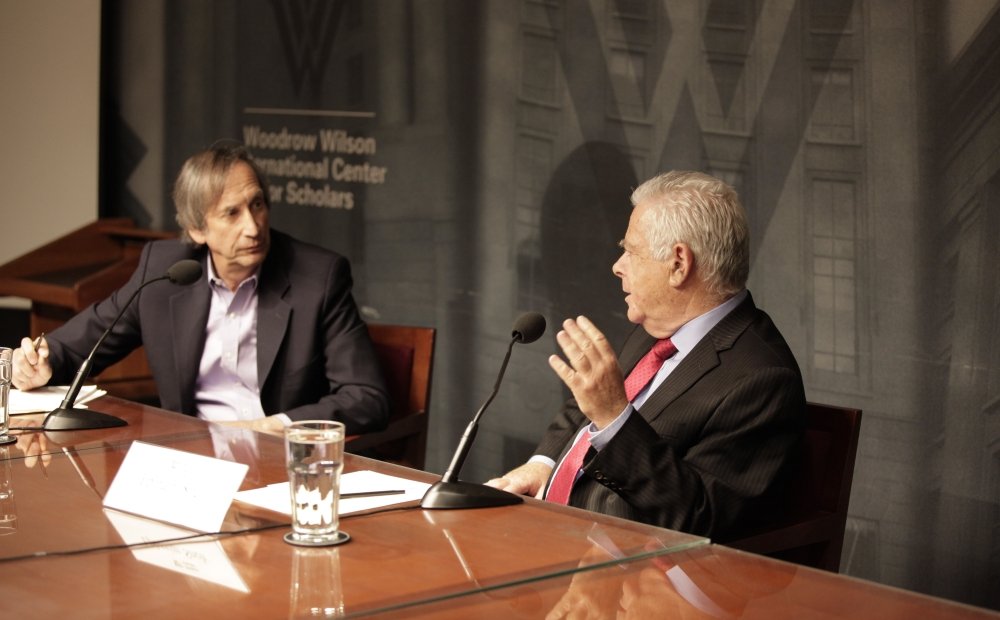A Conversation with Ephraim Sneh

Ephraim Sneh, Chairman of S. Daniel Abraham Center for Strategic Dialogue, Netanya Academic College and former Israeli Deputy Minister of Defense, discussed the results of the Israeli elections, prospects of peace with the Palestinians, and the P5+1 nuclear deal with Iran.
On April 28, 2015, the Joseph and Alma Gildenhorn Middle East Forum of the Middle East Program at the Woodrow Wilson Center hosted an event “A Conversation with Ephraim Sneh” with Sneh. Aaron David Miller, Vice President for New Initiatives and Distinguished Scholar, Woodrow Wilson Center moderated the event.
Aaron David Miller started by asking Sneh to explain the results of the March 2015 Israeli elections. Sneh responding by clarifying that the Israeli public is divided into thirds: one third is in favor of a one-state solution, the second third is in favor of two-state solution, and the last third is undecided. The last, “undecided” third decides the results of the elections, according to Sneh. Prime Minister Benjamin Netanyahu succeeded in playing on the fear of Arab influence in Israel, leading the undecided third to vote for his party. Miller asked if the Israeli public has shifted from the center to the right in recent years. Sneh responded that the right wing has increasingly diminished over the past eight years; even Likud leaders are more accepting a two-state solution and the idea that Israel should make a deal with the Palestinians.
On the issue of national security, Miller asked Sneh to identify the most critical security challenges to Israel. Sneh differentiated between the magnitude and the severity of the threat to security; while Iran may represent a great threat with its large weapon arsenal and regional ambitions, resolving the ongoing conflict with Palestinians is a more pressing and important challenge. Sneh reasoned that the conflict denies Israel the ability to recruit allies and friends to face the threat of Iran and contradicts the ideals upon which Israel was founded. For the majority of Knesset members, the top priority is the issue of settlements—no other issue is as close in importance. When asked about what could possibly change Israel’s priorities, Sneh responded that he sees nothing currently which would change them.
Miller then asked Sneh about his assessment of the P5+1 nuclear deal with Iran. Sneh affirmed that it does not matter what the final deal is—what Israel focuses on is technicalities not substance. The agreement does not irreversibility dismantle Iran’s nuclear program or its capability of producing nuclear weapons. On the contrary, the deal provides the Iranian regime with an opportunity to amass wealth to finance Hamas, the Houthis, and proxies in Iraq, giving Iran a more prominent regional role. More importantly, the deal gives legitimacy to a regime whose ideology rejects democracy and secularism. The agreement may even bring about a de facto partition of the Middle East into two spheres of influence: American and Iranian.
In the question and answer portion of the event, Sneh responded to a question on the geostrategic impact of the 2011 Arab uprisings and their aftermath on Israel’s security. He stated that the Arab uprisings changed the character of military threats. While the conventional threat from Arab armies is over, the threat from non-state actors’ is increasing—not strong enough to destroy Israel but enough to inflict serious damage. On the topic of Iran, Sneh affirmed that the threat to Israel is not the Iranian people, but instead the Iranian regime, because of its extreme interpretation of Islam, its desire to force its ideology onto other states, and its ambition to be a dominant power in the world. Finally, Sneh concluded by reaffirming his belief in the necessity and feasibility of Palestinian-Israeli co-existence. The current Palestinian leadership is ready to reach a peace agreement with Israel but it lacks the courage to tell its own people that refugees will not be allowed to come back. The Israeli government, on the other hand according to Sneh, lacks the courage to tell its own people that a united Jerusalem is unattainable.
By: Khadiga Omar, Middle East Program
Speakers

Hosted By

Middle East Program
The Wilson Center’s Middle East Program serves as a crucial resource for the policymaking community and beyond, providing analyses and research that helps inform US foreign policymaking, stimulates public debate, and expands knowledge about issues in the wider Middle East and North Africa (MENA) region. Read more
